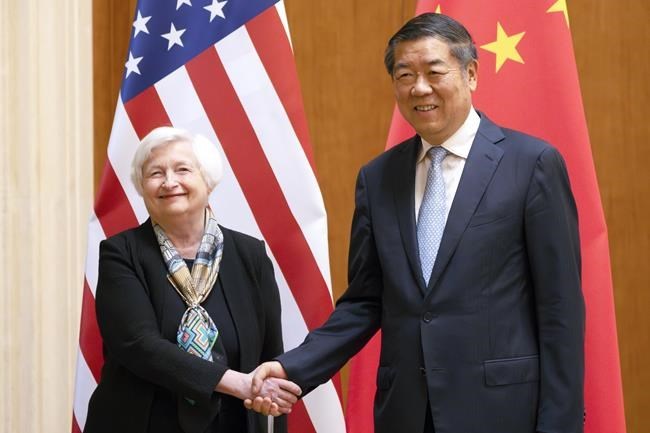WASHINGTON (AP) — The U.S. Treasury Department and China's Ministry of Finance launched a pair of economic working groups on Friday in an effort to ease tensions and deepen ties between the nations.
Led by Treasury Secretary Janet Yellen and Vice Premier He Lifeng, the working groups will be divided into economic and financial segments.
The working groups will “establish a durable channel of communication between the world’s two largest economies,” Yellen said in a series of tweets detailing the announcement. She said the groups will “serve as important forums to communicate America’s interests and concerns, promote a healthy economic competition between our two countries with a level playing field for American workers and businesses."
The announcement follows a string of high-ranking administration officials' visits to China this year, which sets the stage for a possible meeting between President Joe Biden and his Chinese counterpart, Xi Jinping, in November at an Asia-Pacific economic conference in San Francisco.
China is one of the United States’ biggest trading partners, and economic competition between the two nations has increased in recent years. The two finance ministers have agreed to meet at a “regular cadence,” the Treasury Department said in a news release.
Yellen, along with other Biden administration officials, traveled to China this year after the Democratic president directed key senior officials to “maintain communication and deepen constructive efforts after he met with Xi in Bali last year.
The groups' launch also comes after Secretary of State Antony Blinken met with China’s vice president on Monday on the sidelines of the U.N. General Assembly.
Working groups between the U.S. and China are not a new creation.
Reps. Rick Larsen, D-Wash., and Darin LaHood, R-Ill., set up a working group in 2005 between lawmakers in the two nations. And as recently as August, Commerce Secretary Gina Raimondo said she and Commerce Minister Wang Wentao promised to set up a working group of officials and private sector representatives to “seek solutions on trade and investment issues.”
Areas of disagreement between the nations have included tariffs, technology and China’s claims to self-governing Taiwan and large parts of the South and East China Seas.
Tensions between the countries reached a fever pitch earlier this year when a Chinese surveillance balloon was spotted traveling over sensitive U.S. airspace. The U.S. military shot the balloon down off the Carolina coast after it traversed sensitive military sites across North America. China insisted the flyover was an accident involving a civilian aircraft and threatened repercussions.
In April, Yellen called out China’s business and human rights abuses in Xinjiang, Hong Kong and Tibet while striking a conciliatory tone about how there is “a future in which both countries share in and drive global economic progress.”
Relations between the two countries have become further strained as the Communist nation has grown its ties with Russia despite its continued invasion into Ukraine.
The U.S. last year moved to block exports of advanced computer chips to China, an action meant to quell China’s ability to create advanced military systems including weapons of mass destruction, Commerce Department officials said last October.
Fatima Hussein, The Associated Press



